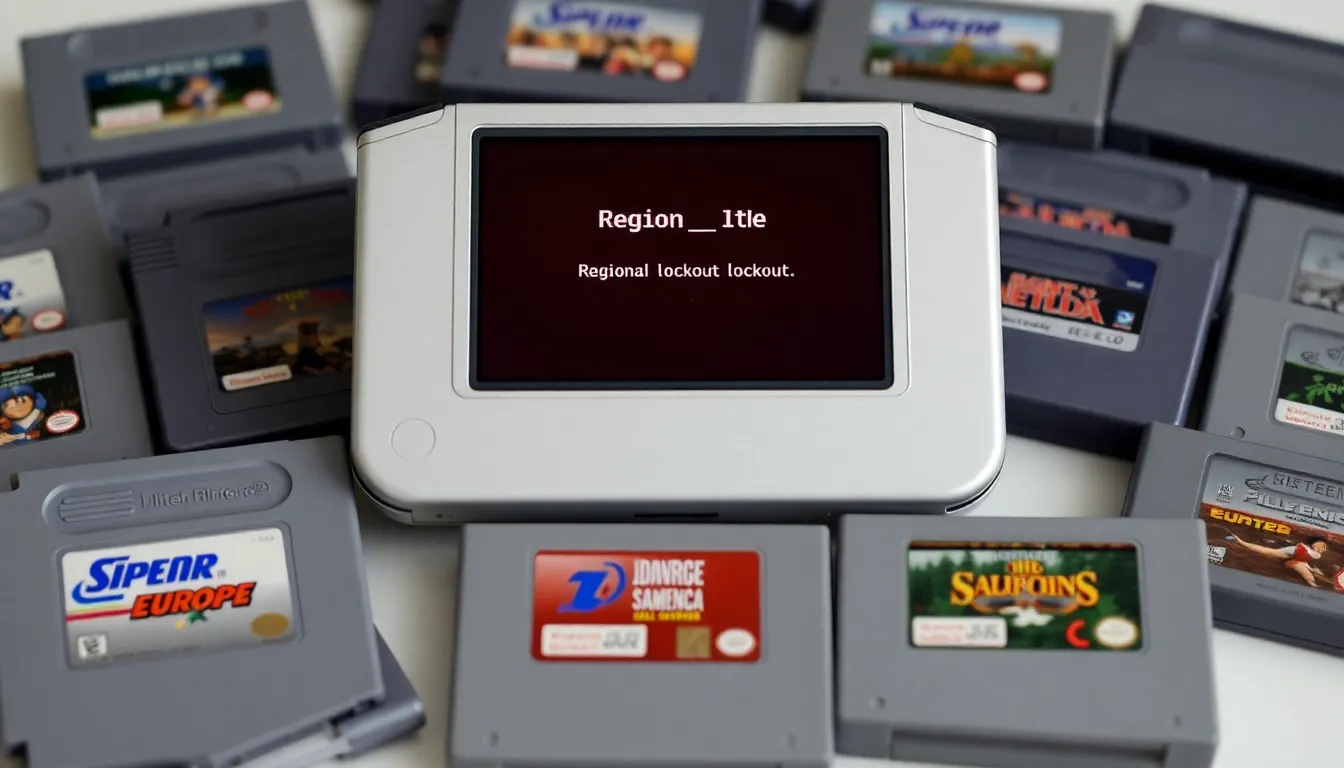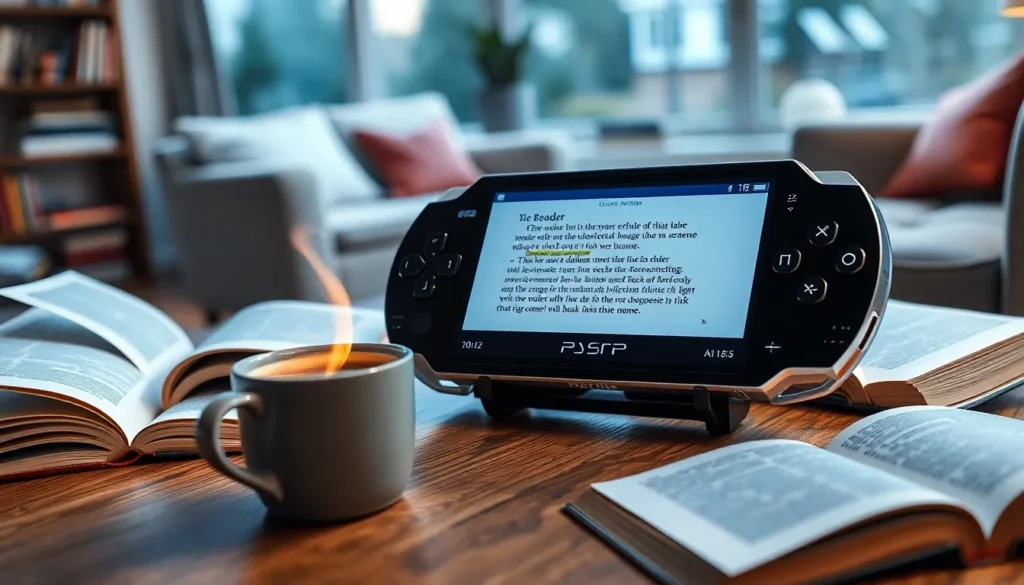Table of Contents
TogglePicture this: you’ve just scored a shiny new PSP game, only to discover it’s locked tighter than a vault at Fort Knox. Welcome to the world of PSP regional lockout—a quirky little feature that has gamers scratching their heads and rolling their eyes. This cheeky restriction can turn a much-anticipated gaming experience into an international scavenger hunt, leaving players wondering why their console suddenly feels more like a paperweight.
Overview of PSP Regional Lockout
PSP regional lockout prevents certain PlayStation Portable games from being used across different geographical locations. This feature causes frustration among gamers who discover that a new game can’t be played on their console because of where they live. Game developers implement this lockout to manage licensing rights and distribution codes, leading to significant inconveniences for users.
Different regions, such as North America, Europe, and Japan, often have distinct versions of the same game. These variations might include language, content, or even gameplay mechanics. Consequently, a player in North America might purchase a game from Europe, only to find it incompatible with their PSP system. PlayStation aims to maintain a structured market but inadvertently complicates the gaming experience for users.
Gamers often express exasperation when subjected to this limitation, as it requires them to seek out region-specific games. Some players invest time and resources searching for compatible titles. Bypassing regional restrictions, such as through modifications or custom firmware, remains a topic of debate among gaming communities.
Additionally, purchasing games from unfamiliar regions can introduce risks regarding compatibility and support. Many online marketplaces may not ensure that the games purchased will function on the buyer’s PSP system. Understanding the impact of regional lockouts enhances awareness regarding game purchases, as players navigate the complexities of the gaming landscape. The importance of knowing one’s console region cannot be overstated for an optimal gaming experience.
How PSP Regional Lockout Works

PSP regional lockout restricts game compatibility based on geographic location. This mechanism prevents players from using games purchased in one region on consoles assigned to another.
Mechanism of Lockout
Lockout operates through the console’s firmware which checks the region code of both the game and the system. Each game disc contains a specific region code that matches its intended console region. If there’s a mismatch, the console rejects the game, rendering it unplayable. Developers implement this to maintain control over distribution agreements and licensing. This design means that even if players acquire a game they wish to play, regional restrictions often make it inaccessible on their handheld devices.
Affected Regions
Major gaming regions include North America, Europe, and Japan. Each region often experiences unique game versions, different translations, or customized content. North American players frequently encounter problems with European or Japanese titles, as their consoles are locked to specific regions. Online marketplaces may exacerbate this issue since many sellers do not specify which region a game is intended for. Understanding these distinctions is essential for gamers aiming to maximize their library while minimizing compatibility headaches.
Impacts on Gamers
The regional lockout significantly alters the gaming experience for many players. Accessing a broad catalog of games becomes challenging due to restrictions based on geographic locations.
Game Availability
Gamers face limited options when purchasing titles. When a player in North America attempts to buy a game from Europe, incompatibility issues often arise. Different versions may not only differ in language but also in content and gameplay mechanics. This discrepancy forces many gamers to hunt for region-specific releases. Some may even resort to online marketplaces, where risks associated with compatibility and support exist. Availability becomes a game of chance rather than an assured collection. The frustration leads to conversations in gaming communities about potential solutions, including modifications or alternative firmware to bypass these restrictions.
Device Functionality
Device functionality suffers under regional lockout conditions. Each console checks game region codes against its own, and any mismatch renders games unplayable. Such restrictions limit the device’s full potential, preventing players from enjoying a complete gaming library. Firmware updates might alter some functionalities, yet they cannot change region coding. Many gamers rely on specific firmware to engage with a global catalog. Understanding device compatibility becomes crucial for maximizing gaming experiences. Gamers regularly discuss these limitations in forums, seeking advice on maintaining optimal performance with their PSP systems.
Bypassing PSP Regional Lockout
Bypassing the PSP regional lockout involves navigating various challenges while considering legal implications.
Legal Considerations
Gamers should understand that bypassing regional lockout might violate user agreements. Engaging in actions like modifying firmware or using unauthorized tools can lead to potential legal risks. Copyright laws exist that protect game developers and may result in repercussions for players. Without clear understanding, users could inadvertently breach terms of service, which may affect access to online features and support. Players should consult legal resources to grasp how these laws apply to their specific cases.
Methods and Tools
Several methods exist for bypassing PSP regional lockout. Custom firmware serves as a popular choice among gamers eager to access a broader library. Using tools like Open Edition or Pro CFW enables system modifications, allowing users to play games from different regions. Game backups can also be employed, provided they follow the original licensing terms. Regular discussions in gaming forums often yield updates on emerging tools and techniques. Utilizing these resources can help gamers explore their options while staying informed about associated risks.
Future of PSP Regional Lockout
Embracing change appears crucial for the future of PSP regional lockout. The gaming landscape evolves rapidly, with shifts in technology and user expectations. Custom firmware options may continue to grow in popularity, allowing gamers more freedom to access titles from various regions. Players increasingly seek a unified experience, prompting discussions about the viability of eliminating regional restrictions in future gaming consoles.
Recent trends indicate that developers recognize the frustration caused by regional lockouts. In response, some game publishers are starting to offer universal versions of their titles. Such versions eliminate the incompatibility issues gamers face, enhancing accessibility to larger libraries of games without geographical barriers.
Legal considerations also impact the future of regional lockout practices. Copyright laws could adapt, potentially allowing for broader access to games without restricting distribution based on location. Awareness of these changes may encourage gamers to stay informed about their rights and options when navigating these complex legal landscapes.
In addition, online gaming communities play an essential role in shaping the future of regional accessibility. As gamers share knowledge and experiences, their collective voices influence developers to consider their needs. Successful outcomes often arise from user feedback, demonstrating the power of community engagement in the gaming industry.
Emerging technologies could further transform regional lockout implications. Streaming services and cloud gaming offer new methods for accessing games without the constraints of physical media. As these services gain traction, the traditional regional lockout model may become less relevant in the overarching gaming narrative.
The PSP regional lockout remains a significant hurdle for gamers who want to enjoy a diverse library of titles. This limitation not only affects gameplay but also complicates purchasing decisions and access to content. As the gaming community continues to voice concerns, there’s hope for a shift toward more inclusive practices in game distribution.
Emerging technologies and changing market dynamics may lead to a future where regional restrictions are less relevant. Gamers are encouraged to stay informed about their options and consider the implications of bypassing these locks. As developers listen to player feedback, the industry may evolve, fostering a more accessible gaming environment for everyone.




